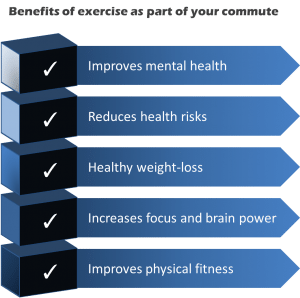
The Health Benefits Are Clear…
The health benefits of dropping a routine commute for one based on physical activity are now clear, and impressive.
Changing to a physical mode of transport such as using your feet to get you from ‘a to b’ can have great health benefits, save you money and make a positive environmental impact. While in some situations it may be necessary to use a vehicle, it is worth considering the advantageous effects of making your own way to wherever your daily commute takes you.
Of commutes in recent years, over 80% were done by car, van or taxi [1]. With access to personal vehicles being ubiquitous, it is tempting for many to use their cars to get to work on a daily basis, making up 62% of trips taken in the UK. However, with the introduction of many alternative means of transport, it is important to consider the benefits of other means of getting around.

Longer Life
It is no myth that regular exercise will contribute to increasing your lifespan. It is recommended by the NHS that adults between the ages of 19 and 64 undertake at least 150 minutes of moderate aerobic activity or equivalent per week, plus two or more days of strength exercises that include the major muscle groups of the body [2]. For many, a daily brisk walk or leisurely cycle to work will more than cover this minimal threshold.
An American study showed that achieving a minimal threshold of exercise reduces mortality risk. Moreover, exceeding minimum exercise thresholds comes with increased benefits to the lowering of mortality. A higher amount of exercise (within reasonable limits) leads to a greater benefit of increased lifespan. However, always be conscious not to over-exercise, as exercising more than five times the amount of the guideline stopped gaining more lifespan benefits, according to the American 2008 Physical Activity Guidelines [3].
Those that exercise regularly, at or above the minimum recommended amount, without over-exerting have many associated life and health benefits. These include:
- Reduced risk of heart attack or stroke
- Increased average lifespan
- Improved cardiovascular fitness
- Enhanced muscular strength

Mental health
Mental health is a vital part of our lives, with ever-increasing importance being placed on this aspect of our daily existence. Exercise is a proven and effective method for many mental health issues, including the more common features such as depression and anxiety [4]. Scientific studies have shown that engaging with an exercise intervention of choice improved overall satisfaction and frame of mind, as well as importantly reducing depressive symptoms in younger adults [5]. This is applicable to all ages and encompasses not just heavy exercise, but also lower intensity regimes such as simply walking to work.
Exercise is in many cases easy to implement into a routine, and can be an effective way to:
- Improve mental wellbeing
- Reduce anxiety
- Combat depressive symptoms
Physical health
As well as the mental benefits of making you happier, getting to work on foot will significantly improve your physical fitness over time. Burning calories during your commute will help you get skinner, and continue to burn calories after exercise through ‘afterburn’ to keep your metabolism processing while you work. It will also strengthen the muscles, maintaining your joints and protecting you in the long term from ailments such as arthritis with regular exercise. You don’t need to be sprinting to work to reap all these profits too, as studies have shown that great physical benefits come when you’re exercising at a rate above an easy pace, but not at your maximum maintainable pace.
Why would you not try switching up your commute, when you can benefit from:
- Weight loss
- Reduced body fat
- Increased muscular strength
- Joint protection (low-impact exercise is optimal)
Both walking and running are great ways to make your commute, and any exercise is better than none. A great example of low-impact exercise, especially suitable to not put strain on the joints and for long-term joint protection, is cycling. However, be creative and motivated to try new and other ways of exercising on your journey to work – the key is being motivated.
Focus, attention and brain power improvement
Do you tend to arrive to work in the mornings with a slump in energy, focus and a declined capacity for motivation? Commuting to work by means of physical exercise gets your blood flowing throughout your body, but also to your brain, keeping you alert and sharp. A morning self-propelled commute is an easy tweak to your daily routine which can significantly improve productivity, time management and engagement. It also helps to overcome post-lunch fatigue, allowing an improvement in your performance at work throughout the day.
How do I start being more healthy?
Now that you know some great reasons why you should swap out your commuting habits, consider these initial ways of taking advantage of these health benefits:
- Change your commute to not need a vehicle
- Walk part of the way on your commute
- Park further away than you usually would
- Invest in a bicycle
- Take breaks in your day to walk/cycle etc.
Considering this, are you convinced to try an exercise-centric method of getting to and from work? If using public transport, you can always walk, run or cycle the morning commute and take the bus for the ride home as a way to get started. Comment your thoughts, and for any health advice needed before setting out on your trip of physical and mental improvement, speak to your dedicated team of healthcare professionals at e-Surgery.
Sources
- Transport Statistics Great Britain. | Department for Transport
- Physical Activity Guidelines for Adults. | NHS
- Exercise makes you live longer. | PubMed
- Fundamental Facts about Mental Health. | Mental Health Foundation
- Exercise helps with depression. | PubMed
Further Reading
- 11 Benefits of Cycling, Plus Safety Tips | Healthline
- Walking for health | NHS
- Commuter health | RSPH







